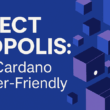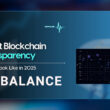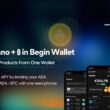Cardanoscan is an explorer of the Cardano blockchain, both Mainnet and Testnet. Cardanoscan Explorer is ranked # 25190 on Alexa, according to global internet traffic, with approximately 250,000 active users.
It is a widely used platform. Its interface is very intuitive, in 4 languages, English, Spanish, Japanese and Korean. It provides all the necessary data on the blockchain, reading of epochs, blocks, transactions with metadata, information on mining of native tokens, pools, delegation certificates and registry keys, and is the only one that clearly and distinctly exposes the rewards received by Catalyst in its detail “Instantaneous Rewards”, in addition to a bot for the Telegram messenger, which alerts on the activity of the pools chosen to report.
The Cardano ecosystem has a variety of blockchain explorers, which generally provide the same information, but some stand out above others in terms of data exposure, or more. The official explorer, Cardano Explorer, developed by IOHK, is basic, it only presents the reading of the last signed blocks and a search engine for epoch, blocks, addresses or transactions. Others, developed by the community, much more complete, such as ADApools, PoolTool, ADAex, Pool.pm, ADAtainment, AdaTools, AdaStat, Cardano Blockchain Insights, among others, and of course Cardanoscan.
All this information, which can be manually consulted in public, needs an interface so that developers can read the data and take it to their applications. In this way, developers will not waste time managing their product infrastructure. This requires a backend service without a server, and an API with data that Cardanoscan will provide.
Why an API Service?
For developers to create DApps, wallets, NFT marketplaces, and other applications, they need to query the Cardano blockchain metrics. Currently, this is done through a database synchronization tool called DB Sync.
Cardano DB Sync is one of the core components of the Cardano architecture, as it provides a way to find and query historical information from the Cardano blockchain by using a relational database in structured query language (SQL). DB Sync connects to the local node as a client, and syncs with the activity on the chain.
DB Sync can be used by Cardano users and developers, who want to know specific details about block production and recent transactions. These details include information on the blocks that allow users to follow the chain, and explore the transactions within the blocks, but exclude cryptographic signatures.
For this, developers have to run their own infrastructure, and end up wasting a lot of time building it. An API service provides serverless scalability, so developers can build applications without relying on their own backend systems.
Developers will be able to build pretty much everything into Cardano, using this API service, some common applications range from implementing group updates on their website to bots etc.
This API service would also allow applications to send transactions over the network. This will be a backbone for the new era of smart contracts at Cardano, as developers will be able to use this service to build swap services, DEX applications, among other uses.
This can also be a great service for a wallet backend, which will allow many developers to build wallets on Cardano without worrying about infrastructure.
To summarize, the main use cases are as follows:
- DEX
- Swaps
- Wallet Backends
- ADA Payment Gateways
- Native Asset Metadata and queries
- NFT marketplace listing APIs
- Analytics dashboards
- Smart contracts metadata APIs
- Telegram bots
- Pool tracking tools
Blockfrost is a similar service. With the new Cardanoscan API, the community will have another option, providing variety in the supply of infrastructure providers, necessary for this great ecosystem.
The Cardanoscan API service will be for both Mainnet and Testnet, delivering rich documentation and a free plan for the community, which will allow developers to play with Cardano, integrating applications that are small-scale and for light use cases.
This is a service in constant operation and will have recurring costs to maintain it, consuming costs for the developers and for the infrastructure. That is why the team is requesting this initial push through Catalyst.
Who are the Developers?
The Cardanoscan team is led by Ashish Prajapati, its founder. It is the operator of the Cardanoscan Pool 1 [CSN1] and Cardanoscan Pool 2 [CSN2] pools.
The team was funded with USD 7,500 in Catalyst’s FUND5, to develop a Testnet explorer, which was successfully delivered.
It also has funding obtained in FUND4 for the Cardano network library in JS, which is currently under development.
Prajapati also leads the Strica company, which builds open source tools for the Cardano developer ecosystem, powering Cardanoscan.
Github: https://github.com/StricaHQ Website: https://strica.io/
Budget
Developer salary: 2 x USD 26,000
Infrastructure cost mainnet: USD 10,000
Infrastructure cost testnet: USD 6,000
Requested funds: USD 68,000
It is estimated that the project will be completed in 45 business days from the date of the voting results .
The platform: https://cardanoscan.io
The original proposal in Catalyst.











I think you need to check out some new update. Please do research and update. Thanks
I appreciate the time you took for your comment. But look at the publication date. It is a Catalyst proposal for FUND6, it is not research or a project review. The Catalyst proposals we publish here are just that, proposals submitted by developers. Thank you.